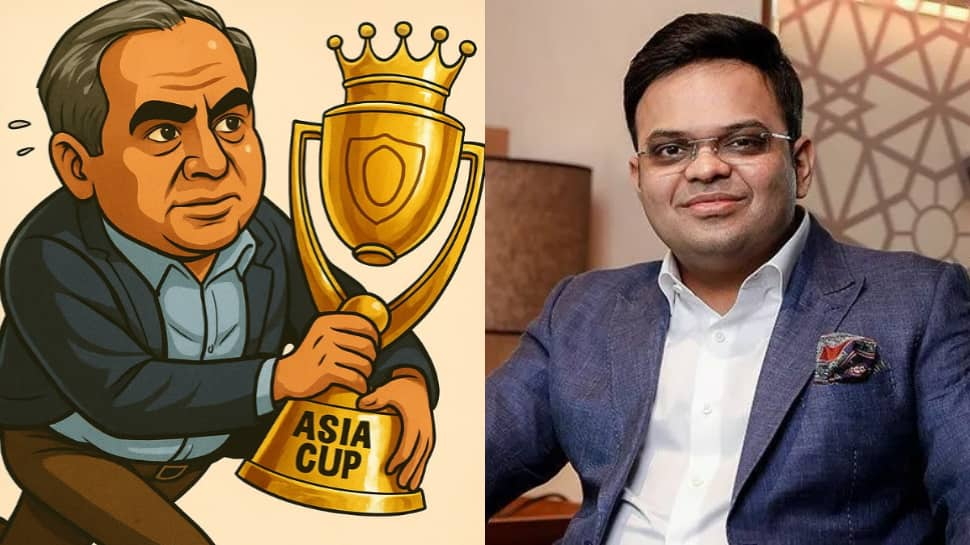The Asia Cup 2025 trophy presentation controversy has taken a new turn as the Asian Cricket Council (ACC) President and Pakistan Cricket Board (PCB) Chairman Mohsin Naqvi has reportedly handed over the custody of the tournament trophy to the UAE Cricket Board. This development occurs amid escalating tensions with the Board of Control for Cricket in India (BCCI), which has threatened impeachment proceedings against Naqvi for his handling of the situation.
What Happened
The Indian team, led by BCCI’s directive, refused to accept the trophy and medals from Naqvi due to his dual role as Pakistan’s Interior Minister and his recent provocative social media posts perceived as anti-India (linked to heightened Indo-Pak tensions, including references to “Operation Sindoor”).
Naqvi, insisting he alone could present the awards, abruptly left the stadium with the trophy and medals, delaying the ceremony by over an hour and forcing India to celebrate without them. This act sparked widespread memes, AI-generated images of Naqvi “fleeing” with the silverware, and chants of “Bharat Mata Ki Jai” from the crowd. BCCI officials condemned it as “unsportsmanlike” and escalated protests at ACC meetings.
Can BCCI Oust Mohsin Naqvi from ACC Presidency?
No, the BCCI cannot unilaterally oust Mohsin Naqvi from his ACC role. Here’s why, based on cricket’s governance framework
ACC Structure and Naqvi’s Position
The ACC is an autonomous regional body under the International Cricket Council (ICC), comprising 30 member associations (full and associate) from Asia, including BCCI (India), PCB (Pakistan), SLC (Sri Lanka), and others like Bangladesh, UAE, and affiliates such as Malaysia and Indonesia. Naqvi was elected ACC President in April 2025 for a standard two-year term (succeeding Sri Lanka’s Shammi Silva). Elections occur via majority vote among ACC members at their Annual General Meeting (AGM), typically rotating regionally but influenced by bloc voting.
BCCI wields significant clout as ACC’s financial powerhouse (contributing ~70-80% of revenues via broadcast rights and sponsorships for events like Asia Cup), but it holds only one vote, like any member. Pakistan, Bangladesh, and Sri Lanka often form counter-blocs, diluting BCCI’s sway.
ICC Rules on Removal
The ICC’s governance (outlined in its 2014 Constitution and subsequent amendments) treats regional bodies like ACC as independent for internal leadership. There are no explicit ICC rules allowing intervention in electing or removing an ACC President’s removal.
The ICC’s Code of Conduct
(Article 2.14 on Conflicts of Interest and Article 4 on Administration of International Cricket) focuses on officials’ impartiality during events, not ousting elected leaders.Violations (e.g., Naqvi’s perceived bias favoring Pakistan, like demanding match referee Andy Pycroft’s removal post-India-Pakistan no-handshake row) could trigger ICC investigations via its Ethics Officer or Code of Conduct breaches, but penalties are limited to fines, suspensions from specific duties, or event bans—not removal from ACC presidency.
Historical precedent: In 2018, ICC sanctioned PCB officials for similar biases but didn’t remove them; resolutions stayed within regional diplomacy.
Removal from ACC would require a no-confidence motion or fresh election at an ACC AGM/EGM, needing a two-thirds majority (per standard ICC-aligned regional bylaws). BCCI could lobby allies (e.g., Sri Lanka supported India at the September 30, 2025, ACC AGM), but Naqvi’s PCB-backed allies (Bangladesh, UAE) make this unlikely before his term ends in April 2027.
BCCI’s Leverage and Likely Path Protests, Not Ousting
BCCI has already lodged formal complaints at the ACC AGM (September 30, 2025, Dubai), where representatives Rajeev Shukla and Ashish Shelar “cornered” Naqvi, demanding the trophy’s return (still unresolved; Naqvi “beat around the bush” and didn’t congratulate India). They plan a “strong, serious” escalation at the ICC Board meeting in Dubai (November 2025). Outcomes could include:ICC mediation for trophy handover (likely, as trophy is ACC property).
Sanctions on Naqvi/PCB for conduct breaches (e.g., barring from future ACC events).
But no removal ICC avoids overriding regional autonomy to prevent “Big Three” (BCCI, ECB, CA) dominance accusations.
Long-Term Play: BCCI could push for ACC constitutional tweaks (via ICC approval) to bar dual-role officials (e.g., national ministers) or enforce neutrality clauses. With Jay Shah as ICC Chair (since December 2024), BCCI has indirect influence, but overt ousting risks fracturing Asian cricket alliances.
In summary, while BCCI can pressure Naqvi through protests and ICC channels potentially humiliating him further (as seen in the AGM walkout) ouster requires ACC consensus, which isn’t feasible now. The “Trophy Chor” saga highlights cricket’s Indo-Pak fault lines but won’t topple Naqvi’s chair anytime soon. If tensions escalate, watch for BCCI boycotts of future ACC events.

